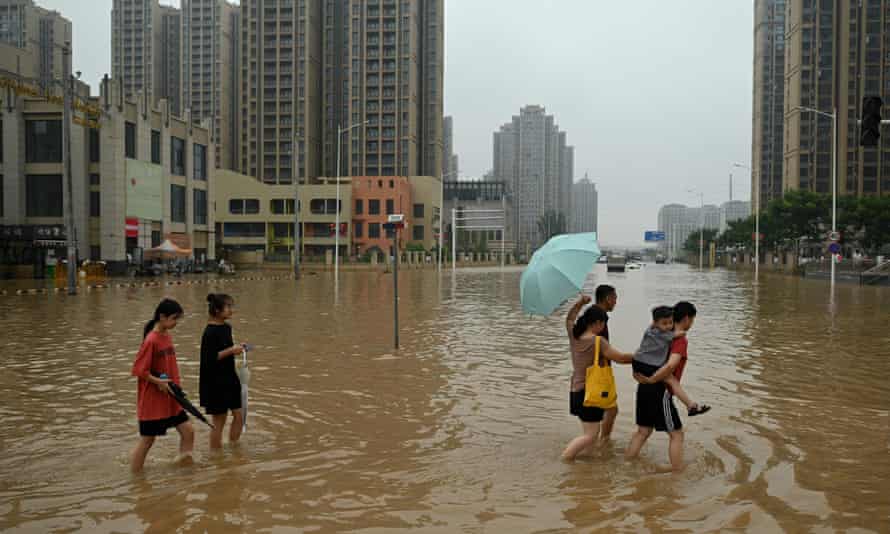Foreign journalists harassed in China over floods coverage
Reporters confronted in street and accused of ‘smearing China’ amid increasing sensitivity to any negative portrayals of China

Foreign journalists reporting on the aftermath of China’s flooding disaster have faced hostile confrontations in the street and been subjected to “vicious campaigns”, amid increasing nationalistic sensitivity to any negative portrayals of China.
Reporters from the Los Angeles Times and German outlet Deutsche Welle were confronted by an angry crowd in Zhengzhou on Saturday, who filmed and questioned them, and accused them of “rumour mongering” and slandering China. Other journalists have also been targeted, with a specific focus on the BBC.
The journalists Alice Su and Mathias Boelinger, were on the ground in Zhengzhou, covering the aftermath of last week’s deadly floods, after almost a year’s worth of rain dropped around Zhengzhou in three days, overwhelming streets and subway tunnels. The rains then moved north, further devastating major cities and rural areas.
Su said they were in an area where underground markets had flooded and many shopkeepers had lost their assets and were “distressed about insufficient government help”.
“There were many other ppl [sic] in Zhengzhou and the surrounding worse-hit areas who were open and even eager to talk about the destruction and difficulties they’re facing,” Su tweeted. “But this crowd seemed really angry and eager just to tell the foreigners off.”
Describing the incident on Twitter, DW’s Boelinger said he was pushed and yelled at for “smearing China”, and that it became apparent the crowd believed he was the BBC correspondent Robin Brant.
“What I did not know at the time was that a manhunt was on after [Brant],” said Beolinger. “There is a vicious campaign against the BBC News in nationalistic circles and state media.”
Stephen McDonell, another BBC correspondent in China, said on Twitter there was a “clearly orchestrated campaign of harassment”, with a focus on the BBC, which included threats of violence and family-targeted abuse sent to the private phones of to those working in the foreign media.
“You have to ask why organs of the Communist party are doing this given that the reporting I’ve seen would appear to engender sympathy for the people of Henan,” he said.
A hashtag related to Saturday’s incident had been viewed more than 27m times on Weibo, much of it critical, and some highly abusive and threatening, including personal information of the journalists. Some commenters called for journalists including Boelinger and Su to be deported, while the Communist Youth League called for people to follow Brant and report his location.
Su said on Twitter some people in the Zhengzhou crowd had sought to de-escalate the situation, and at least one man apologised, but “it was not a pleasant experience”. Other reporters replied saying they had experienced similar situations while reporting on the floods, and posts on Weibo also targeted reporters from Al Jazeera and CNN. Commenters also identified and criticised the woman trying to de-escalate things as a local journalist.
The official death toll from the floods is at least 69, with five missing, but Chinese media have identified at least 22 people who have not been heard from since Tuesday afternoon.
According to China Digital Times, Chinese media, which are strictly monitored and controlled by authorities, were ordered to only report “authoritative information” about casualties and property damage, and instructed not to “take an exaggeratedly sorrowful tone or hype or draw connections to past events” without permission.
Rising nationalism in China and hostility towards foreign media have made reporting increasingly difficult and risky for foreign outlets.
In the past 18 months at least 16 US journalists have been expelled, and at least four journalists – including the BBC’s John Sudworth and two Australian journalists – were forced to flee. Two others – Australian TV anchor Cheng Lei and Chinese Bloomberg journalist Haze Fan – were arrested and detained on undefined national security accusations.
Additional reporting by Jason Lu
No comments:
Post a Comment